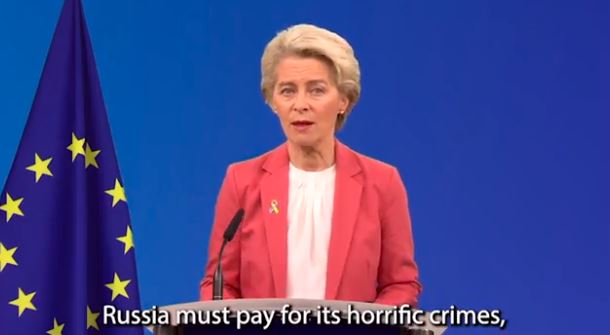With the support of the UN, the EU proposes to create a specialized court to investigate and prosecute the crime of Russian aggression, European Commission President Ursula von der Leyen said on 30 November. As well, the EU proposes confiscating Russian assets that have been frozen to punish Moscow for invading Ukraine, exploring legal options with EU partners to compensate Kyiv for damage from Russian aggression.
Russia must pay for its horrific crimes.
We will work with the ICC and help set up a specialised court to try Russia’s crimes.
With our partners, we will make sure that Russia pays for the devastation it caused, with the frozen funds of oligarchs and assets of its central bank pic.twitter.com/RL4Z0dfVE9
— Ursula von der Leyen (@vonderleyen) November 30, 2022
“While continuing to support the International Criminal Court, we are proposing to set up a specialized court, backed by the United Nations, to investigate and prosecute Russia’s crime of aggression. We are ready to start working with the international community to get the broadest international support possible for this specialized court,” she said.
A specialized court, or tribunal, for the crime of aggression against Ukraine, has been viewed by experts as the only way to punish Russia for its invasion and bring its leadership to accountability, as none of the existing international judicial institutions have the proper mandate.
We have a dream: why the world needs a Special Tribunal for the Crime of Aggression against Ukraine
Earlier, Ambassador-at-Large of the Ministry of Foreign Affairs of Ukraine Anton Korynevych said that the European External Action Service is preparing a position on possible options for establishing a special tribunal to prosecute the Russian leadership for the crime of aggression against Ukraine.
Kyiv is working on several options for the creation of a special tribunal, one of them – on the basis of an agreement between Ukraine and the UN, which may adopt a resolution.
The establishment of the special tribunal has already been supported by various organizations and states – from the Parliamentary Assembly of NATO, the European Parliament to the national parliaments of Ukraine, Latvia, Lithuania, Estonia, and the Netherlands.
As well, she informed that:
- Russia is estimated to have caused EUR 600 bn worth of damage to Ukraine
- The EU has blocked EUR 300 bn of the Russian Central Bank reserves and frozen EUR 19 bn of Russian oligarchs’ money
“In the short term, we could create, with our partners, a structure to manage these funds and invest them. We would then use the proceeds for Ukraine. And once the sanctions are lifted, these funds should be used so that Russia pays full compensation for the damages caused to Ukraine,” the EU Commissioner stated.
“Russia and its oligarchs have to compensate Ukraine for the damage and cover the costs for rebuilding the country… We will work on an international agreement with our partners to make this possible. And together, we can find legal ways to get to it,” Von der Leyen said.
Debates about handling frozen Russian assets have been going around in the EU for months. The problem is that in most EU states, legally seizing frozen assets is possible only after a criminal conviction. As well, many assets are registered as belonging to front groups and family members.
On 14 November, the UN General Assembly approved a resolution calling upon Russia to be held accountable for its invasion of Ukraine, including by paying reparations.
Ukraine’s President Zelenskyy’s formula for peace in Ukraine presented to the G20 summit includes Russia’s payment of reparations to compensate for the damage it has caused.
Related:
- Tribunal for Putin: a guide to holding Russia’s leadership accountable for war crimes in Ukraine
- How Ukraine is preparing a Tribunal for Putin
- We have a dream: why the world needs a Special Tribunal for the Crime of Aggression against Ukraine
- NATO Parliamentary Assembly designates Russia as a terrorist state, calls for Tribunal
- Ukraine calls on world to create special tribunal for Russia’s crimes
- Ukraine’s formula for peace: Russia withdraws from Ukraine, returns POWs and deportees, pays reparations – Zelenskyy


